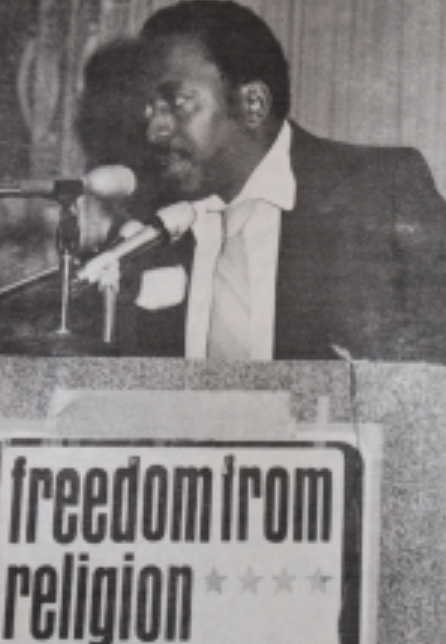On this date in 1944, Ishmael Jaffree (né Frederick Hobbs) was born two months prematurely in a Cleveland home for unwed mothers. His mother was very religious and he never knew his father. Jaffree brought and won the U.S. Supreme Court decision Wallace v. Jaffree, 472 U.S. 38, 72 (1985). Calling him “an authentic American hero,” FFRF inaugurated its Freethinker of the Year award at its 1985 convention to recognize his contributions.
As a child he evangelized on Cleveland street corners, “exhorting sinners to get right with God,” according to a People magazine story (June 24, 1985). At Cleveland State University, he was influenced by a black atheist professor named Jaffree. “I started considering myself an Existentialist. I no longer believed the Christian faith was the faith and that Jesus Christ had blue eyes and white skin.” He changed his name in 1972 to reject “the slave-master path. Ishmael means outcast.”
He married Mozelle Hurst in 1974 after finishing law school. They moved to Alabama in 1977, where he set up a law practice in Mobile. He discovered in 1981 that his children were being fed daily doses of the Lord’s Prayer and grace at lunch, with an occasional bible reading. Jaffree bravely filed a lawsuit in May 1982, challenging a 1978 law authorizing a one-minute period of silence, a 1981 statute authorizing a period of silence “for meditation or voluntary prayer,” and a 1982 law authorizing teachers to lead “willing students” in a prescribed prayer to “Almighty God … the Creator and Supreme Judge of the world.”
During the 1982 trial, U.S. District Judge William Brevard Hand allowed 600 Christians to intervene; school officials led children in prayer in front of media. Jaffree’s children were ostracized, laughed at and subjected to racial epithets and physical harassment. Hand ruled against Jaffree in 1983, claiming the Supreme Court was wrong about state-church separation and that the First Amendment does not bar states from establishing a religion. The case proceeded by way of the 11th Circuit U.S. Court of Appeals to the U.S. Supreme Court.
On June 4, 1985, the Supreme Court ruled 6-3 in Jaffree’s favor, declaring unconstitutional a period of silence for “meditation or voluntary prayer” in public schools.
{Hand received more national attention two years later when he ruled for plaintiffs who claimed Alabama textbooks promoted secular humanism and violated the Establishment Clause. Hand, appointed as a federal judge by President Nixon, ordered statewide removal of textbooks in home economics, history and social studies. The 11th Circuit later overruled him unanimously.)


